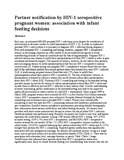| dc.description.abstract | Each year, an estimated 600 000 perinatal HIV-1 infections occur despite the availability of interventions to decrease mother-to-child transmission of HIV-1 [1]. In order to implement perinatal HIV-1 interventions it is necessary to diagnose HIV-1 infection during pregnancy. Even with antenatal HIV-1 counselling and testing, however, pregnant HIV-1 seropositive women in developing countries are often unable to access antiretroviral agents or avoid breastfeeding because of financial constraints and the fear of stigmatization.
Pregnant HIV-1 infected women may choose to notify their spouses/partners of their HIV-1 status in order to gain emotional and financial support. The majority of women, however, do not inform their partners, and encouraging women to notify spouses/partners that they are HIV-1 seropositive remains controversial [2]. Studies among non-pregnant HIV-1 seropositive women found that less than half of the individuals notified their sexual partners when they learned they were HIV-1 infected [3,4]. A study among pregnant women found that only 27% chose to notify their spouses/partners about their positive HIV-1 serostatus [5]. The fear of domestic violence or abandonment is frequently cited as a reason why not all women inform their spouse/partner about their HIV-1 status [6-8].
Voluntary HIV-1 counselling and testing in the antenatal setting provides unique incentives for women to inform spouses/partners about their HIV-1 status and include them in efforts to prevent HIV-1 infection in their unborn child. A better understanding of issues surrounding partner notification in the antenatal setting may lead to the improved uptake of interventions to reduce mother-to-child HIV-1 transmission.
From August 1999 to March 2000, pregnant women were screened for HIV-1 in five Nairobi City Council antenatal clinics. HIV-1 seropositive women were referred to Kenyatta National Hospital for further counselling and recruitment into a perinatal HIV-1 cohort. Women were enrolled after completing at least two post-test HIV-1 counselling sessions with healthcare professionals and peer counsellors. Enrolled women completed a questionnaire providing detailed demographic data, information about partner notification, and infant feeding decisions. All women were provided with short-course antiretroviral therapy to reduce the risk of infant HIV-1 infection. Statistical analysis was performed using Pearson's chi-square test, Fisher's exact test, and logistic regression for multivariate analysis.
Among 7580 women offered HIV-1 testing, 7071 (93%) accepted testing, 1059 (15%) were HIV-1 seropositive, and 883 (83%) HIV-1 seropositive women returned for test results. Of the 172 (19%) HIV-1 seropositive women enrolled in the cohort study, 116 (67%) reported informing their partners about their HIV-1 status and 41 (25%) brought their partners for HIV-1 counselling. Reported partner notification was significantly associated with non-polygamous marriage, the absence of a personal income, living in a single room, and no previous history of a sexually transmitted disease (STD) (Table 1). There was no association with education level, marriage duration, or parity.
Table 1Table 1
Image ToolsWomen who informed their partners about their HIV-1 seropositive status were significantly more likely to choose formula feeding over breastfeeding than women who did not inform their partners [21% versus 9%; odds ratio (OR) 2.7; 95% confidence interval (CI) 1.0-7.5]. In a multivariate analysis controlling for marital status, employment, living in a single room, and previous STD history, partner notification was significantly associated with the decision to formula feed (OR 3.6; 95% CI 1.1-11.6).
In this study, several socioeconomic indicators were identified as correlates of partner notification among pregnant women. Women without financial independence and women living in a single room were more likely to inform their partners that they were HIV-1 seropositive. These women may perceive a need for economic support from their spouse/partner in the setting of HIV-1 seropositivity. Alternatively, they may be less cognizant of the risks associated with partner notification.
An important association between partner notification and a woman's decision to formula feed her infant was also found. In societies in which breastfeeding is the norm, it may be difficult for women to decide to use formula without spousal consent. In addition, because formula is costly, it may not be feasible for a woman to choose to formula feed without her partner's economic support. Although we provided zidovudine to all women in this study, in a non-research setting the use of antiretroviral agents may also require the economic support of the spouse/partner. For some women partner notification of HIV-1 status may thus be essential to obtain access to interventions to prevent mother-to-child HIV-1 transmission.
Determining the most appropriate way to incorporate spouses/partners into efforts to decrease mother-to-child transmission of HIV-1 will be challenging, particularly when women are in abusive relationships or when couples are HIV-1 serodiscordant. More research is necessary to explore barriers to partner notification. In addition, methods for safely increasing partner notification need to be investigated to determine their acceptability, feasibility, and effect on the uptake of interventions to prevent mother-to-child HIV-1 transmission. | en |

